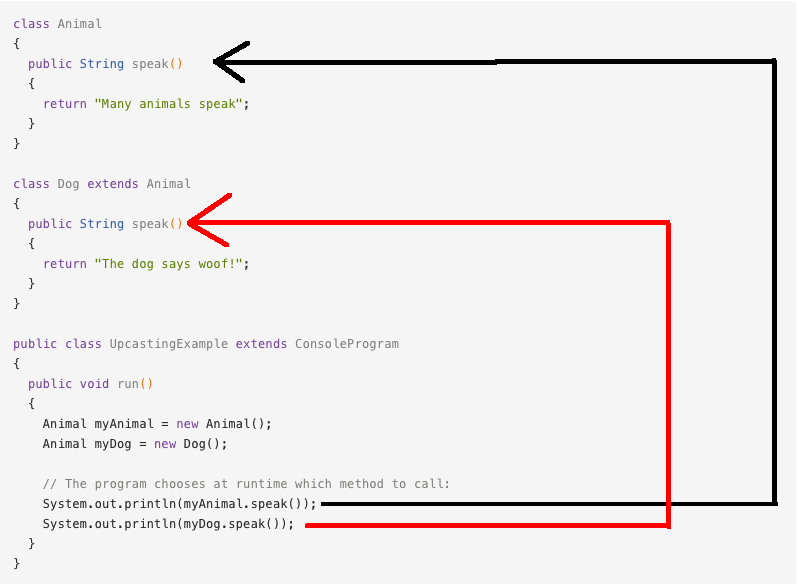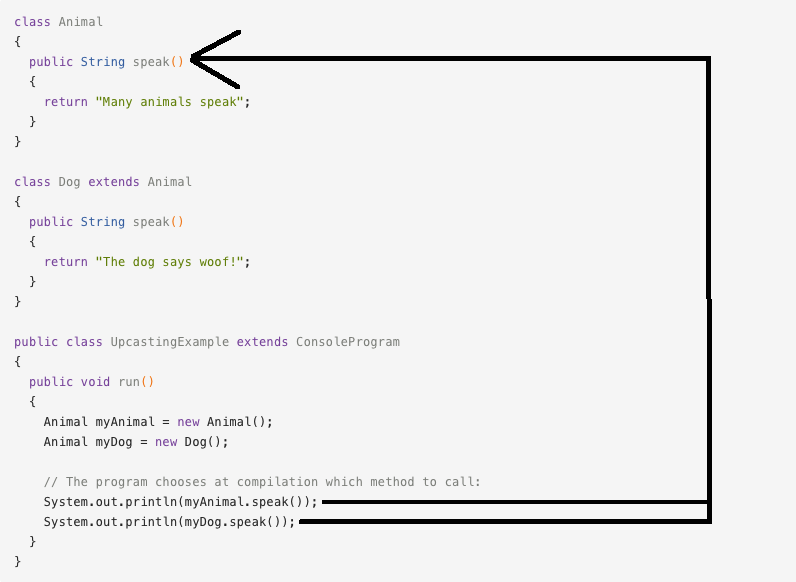Polymorphism
Polymorphism is one of the most important concepts in Object Oriented Programming. Polymorphism is the capability of a single object to take on multiple forms. Polymorphism can also be explained as the ability to perform a single action, in many ways, across multiple objects. This means we can use the same method across different objects, using different implementations.
Concepts of Polymorphism
There are several concepts of polymorphism that are crucial to understand. These include:
Method Overriding: Allows us to call the correct implementation of a method across multiple objects that share the same superclass.
Upcasting: Occurs when the reference variable of a superclass points to the object of the subclass. This allows us to go from a low level class type to a higher level one.
- ex:
Animal fox = new Fox();,Animal dog = new Dog();
- ex:
Downcasting: Occurs when the reference variable of a subclass points to an object of the superclass type. This will manually convert the object type to that of the subclass.
- ex:
Animal animal = new Fox();Fox castedFox = (Fox) animal
- ex:
Dynamic Binding: Is the concept where the proper method implementation is chosen at run-time, and not compilation.
Static Binding: Is the concept where the proper method implementation is chosen at compilation, and not run-time.
Method Overriding
Method Overriding allows us to use the same method across multiple objects, with differing implementations. Let's take a look at an example of this concept:
public abstract class Animal
{
public abstract String speak();
}
public class Dog extends Animal
{
public String speak()
{
return "The dog says woof!";
}
}
public class Fox extends Animal
{
public String speak()
{
return "What does the fox say?";
}
}
public class UpcastingExample extends ConsoleProgram
{
public void run()
{
Animal myFox = new Fox();
Animal myDog = new Dog();
/* Polymorphism here is seen as the correct implementaiton of `speak()`
* being chosen, regardless of the object type. */
System.out.println(myFox.speak()); // Will print `What does the fox say?`
System.out.println(myDog.speak()); // Will print `The dog says woof!`
}
}
Upcasting:
Upcasting refers to taking an object of a lower level class type and referencing it to a class of a higher level. Lets look at an example of this:
public abstract class Animal
{
public abstract String speak();
}
public class Dog extends Animal
{
public String speak()
{
return "The dog says woof!";
}
}
public class Fox extends Animal
{
public String speak()
{
return "What does the fox say?";
}
}
public class UpcastingExample extends ConsoleProgram
{
public void run()
{
Animal myDog = new Dog(); // Upcasting
Animal myFox = new Fox(); // Upcasting
System.out.println(myDog.speak()); // Will print `The dog says woof!`
System.out.println(myFox.speak()); // Will print `What does the fox say?`
}
}
Downcasting
Downcasting is conversion of a reference variable's type to that of the subclass. A difference in downcasting, as compared to upcasting, is that you must manually downcast. Lets look at an example of this:
public abstract class Animal
{
public abstract String speak();
}
public class Dog extends Animal
{
public String speak()
{
return "The dog says woof!";
}
}
public class Fox extends Animal
{
public String speak()
{
return "What does the fox say?";
}
}
public class UpcastingExample extends ConsoleProgram
{
public void run()
{
// Upcasting is done automatically
Animal myDog = new Dog(); // Upcasting
Animal myFox = new Fox(); // Upcasting
// Downcasting must be done manually
Dog yourDog = (Dog) myDog; // Downcasting
Fox yourFox = (Fox) myFox; // Downcasting
System.out.println(yourDog.speak()); // Will print `The dog says woof!`
System.out.println(yourFox.speak()); // Will print `What does the fox say?`
}
}
Dynamic Binding
Dynamic Binding is an important concept to runtime polymorphism. It is the concept of the proper method implementation being chosen at run-time. Lets look at an example:

Static Binding
Static Binding is another important concept to polymorphism. Static binding chooses the proper method implementation at compilation, and not run-time. Static binding only checks the type of the reference variable and not where it is pointing. Lets look at an example of this concept:

Polymorphic Arrays
Polymorphic Arrays allow us to store an array of objects with differing types that share the same superclass. Lets see this in action:
public abstract class Animal
{
public abstract String speak();
}
public class Dog extends Animal
{
public String speak()
{
return "The dog says woof!";
}
}
public class Fox extends Animal
{
public String speak()
{
return "What does the fox say?";
}
}
public class Cow extends Animal
{
public String speak()
{
return "The cow goes moo!";
}
}
public class AnimalArrays extends ConsoleProgram
{
public void run()
{
// Create the array and set its size to `3`
Animal[] animalArray = new Animal[3];
// Set each object in the array
animalArray[0] = new Dog();
animalArray[1] = new Fox();
animalArray[2] = new Cow();
// Print out the array
for(int i = 0; i < animalArray.length; i++)
{
// Will print out the various `speak()` methods for each animal.
System.out.println(animalArray[i].speak());
}
}
}